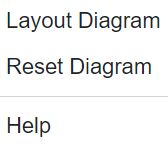Block Definition Diagram Modifications & Settings
Below we'll cover the Block Definition Diagram's construct editing options and Settings.
| Block Editing | Review of the options provided for the Block Construct |
| Port Editing | Review of the options provided for the Port Construct |
| Value (Characteristic), Input Parameter (I/O), Return Type (I/O), Constraint (Equation) and Action Editing | Review of the options provided for these Constructs |
| Multiple Entities Selected Editing | Review of the options provided for Multiple Entities selected |
| Logical Connection Editing | Review of the options provided for the Logical Connections |
| BDD Settings | Review of the Settings provided for the BDD |
The previous article covers the basics of the constructs on the Block Definition Diagram. Below we will cover the constructs' editing options and more.
Block (Asset) Editing Options

Upon selecting a Block construct on the BDD, users have options on the top toolbar frame to modify it on the canvas, below we will cover each option.
Bold
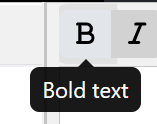
This option will Bold the name of the entity selected on the canvas.
Italicize
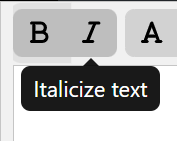
This option will Italicize the name of the Block selected on the canvas.
Change Text Fill Color

Using the HTML Color Picker that drops down from the Text Fill Color Option, users can change the text color of the Block selected on the canvas by selecting the color associated to the desired color simply inputting in the Hex, R, G, B fields the proper codes and numbers.
Change Fill Color
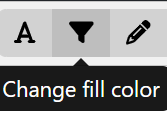
Using the HTML Color Picker that drops down from the Change Fill Color Option, users can change the color of the Block selected on the canvas.
Change Stroke/line color

Using the HTML Color Picker that drops down from the Change Line/Stroke Color Option, users can change the color that borders the Block selected on the canvas.
Reset Color back to default

The Reset color back to default option will change the entity selected on the canvas back to the default gray and black colors.
Port Editing Options

Upon selecting a Port, the following editing options appear on the top of the toolbar frame.

We will cover each option below.
Bold

This option will Bold the name of the Port selected on the canvas.
Italicize

This option will Italicize the name of the Port selected on the canvas.
Change Text Fill Color

Using the HTML Color Picker that drops down from the Text Fill Color Option, users can change the text color of the Port selected on the canvas by selecting the color associated close to the desired color simply inputting in the fields the proper codes and numbers.
Change Fill Color

Using the HTML Color Picker that drops down from the Text Fill Color Option, users can change the color of the Port selected on the canvas.
Change Stroke/line color

Using the HTML Color Picker that drops down from the Change Line/Stroke Color Option, users can change the color that borders the Port construct of the entity selected on the canvas.
Reset Color back to default
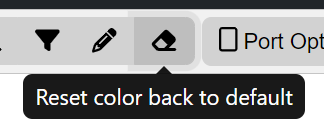
The Reset color back to default option will change the Port selected on the canvas back to the default gray and black colors.
Port Options Dropdown

Options in the dropdown provide users the ability to hide or show the label for the Port or reset the label if it had moved or changed color.
Value (Characteristic), Input Parameter (I/O), Return Type (I/O), Constraint (Equation) and Action Editing Options

The 4 constructs, Value (Characteristic), Input Parameter (I/O), Return Type (I/O), Constraint (Equation) have the same editing options when any of them are selected. Below we will cover those in more detail.
Bold

This option will Bold the name of the construct selected on the canvas.
Italicize

This option will Italicize the name of the construct selected on the canvas.
Change Text Fill Color

Using the HTML Color Picker that drops down from the Change Text Fill Color Option, users can change the text color of the construct selected on the canvas by selecting the color associated close to the desired color or simply inputting in the Hex, R, G, B fields the proper codes and numbers.
Reset Color back to Default

The Reset color back to default option will change the construct selected on the canvas back to the default black color.
Multiple Entities Selected

Users may drag their cursor outside of the constructs and a box will appear to select as many multiple entities the user desires. Many features on the top toolbar will appear upon doing so for the user to utilize. Let's go over each option as highlighted below.
![]()
Bold

This option will Bold the name of the constructs selected on the canvas.
Italicize

This option will Italicize the name of the constructs selected on the canvas.
Change Text Fill Color

Using the HTML Color Picker that drops down from the Text Fill Color Option, users can change the text color of the multiple constructs selected on the canvas by selecting the color associated close to the desired color or simply inputting in the Hex, R G, B fields the proper codes and numbers.
Change Fill Color

Using the HTML Color Picker that drops down from the Text Fill Color Option, users can change the color of the constructs selected on the canvas.
Change Stroke/line color

Using the HTML Color Picker that drops down from the Change Line/Stroke Color Option, users can change the color that borders the constructs selected on the canvas.
Reset Color back to default

The Reset color back to default option will change the constructs selected on the canvas back to the default gray and black colors.
Align Vertically

This selection will align the constructs vertically for the multiple entities selected on the canvas. The vertical line will start with the highlighted green Block, as shown below.

Align Horizontally

This selection will align the constructs horizontally for the multiple constructs selected on the canvas. The horizontal alignment will start with the green highligthed Block as shown below.

Logical Connection Construct Editing Options

When a Logical Connection is selected, the top toolbar frame provides options for users to modify it, as shown above.
Let's delve into the following editing options for the Logical Connections.
Change Stroke/Line Color

Users may change the color of the Logical Connection and the diamond (if included in the Path) with this option.
Reset Back to Default

This option will set the Logical Connection back to the defaulted black (or white diamond) color according to the Path.
Line Options

Following along with the dropdown, users may change the line to straight or orthogonal. If there is a label users may hide or show the label. Also, if the label is dragged and dropped away from the line, a line will be tied to the label to indicate the connection the label is tied to. Users may modify this line to be straight or curved (example below). Lastly, users may reset their label modficiations with the Reset Label option.

Paths

With the Paths dropdown, the selected Path can be changed.
Multiplicity

Circled in red above, these indicators are the multiplicity values applied to the logical connections via relationship attributes. These can be changed simply by clicking on the value in the canvas or in the entity's left sidebar Relationships tab.
Block Definition Diagram Settings
The wrench icon on the top right of the toolbar frame is a fixed dropdown and does not change dependent on what the user has selected. Let's delve into the many options available below.

Levels

The settings dropdown provides users the option to display up to 10 levels of decomposition. When not in the dropdown, note the blue box to the right of the wrench icon, indicating how many levels are selected and displayed in the diagram canvas.
Hide/Show Constructs

The next section of the Settings Dropdown allows users the ability hide (or show) Ports, Constraints, Operations and Values constructs of the diagram.
Cross-Project Indicators
![]()
If using Cross-Project Relationships, users may show or hide indicators on the constructs from other projects in the canvas.
SysML Frame Edits
![]()
⚠️The SySML Frame is the green space the model is placed in on the canvas.

The Edit SysML Frame option will bring up the following modal.

Users may select the color of the frame with the  button indicated in green (the green color on the button will change to whatever color a user sets it to). Or bring it back to the defaulted green with the reset option
button indicated in green (the green color on the button will change to whatever color a user sets it to). Or bring it back to the defaulted green with the reset option  .
.
The remaining options on the Modal are in relation to the textual part located at the top left of the SysML frame, example below.
![]()
The changes made to the Select SysML Diagram option refer to the Model Element Type in the first brackets (ex. [Model] in the picture above). Note, the example above is from a BDD but shows the Model option as displayed in the aforementioned Modal. Therefore it is important to note, users may select any Model Element Type here, even in a different diagram. The text will change but this option will not change the diagram itself.
The Select Parent option is a dropdown to select the Parent entity to be the Model Element Name. This will change the text in between the bracketed texts. In the example above it is the 'Model' text.
Hide/Show SysML Frame

Users may use this option to hide (or show, if hidden) the SysML Frame as they wish.
Auto Number, Layout and Reset Diagram
![]()
Users may also Auto Number their diagrams, where a pop up shows up to allow users to use the action order to determine the number sequence, provide a Prefix or enumerate the single level, as shown below.
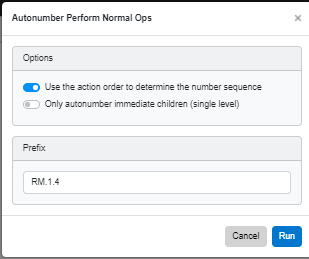
Lastly, the final options in the Settings dropdown provides users to reset their diagram from changes and layout the diagram from previous changes.
The last option, 'Help,' will send users directly to the Help Center page for the Use Case Diagram for convenience.
Frame Fix

When a construct is ouside of the SysML Frame, Innoslate will detect that and bring up a fix for this as indicated with the orange exclamation point that appears next to the Settings dropdown.
When selected, a modal pops up to provide users the ability to fix or ignore the issue.

To continue learning about SysML Diagrams, Click Here.
(Next Article: Parametric Diagram)

